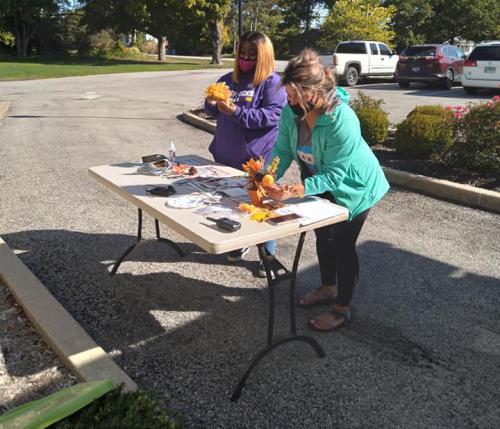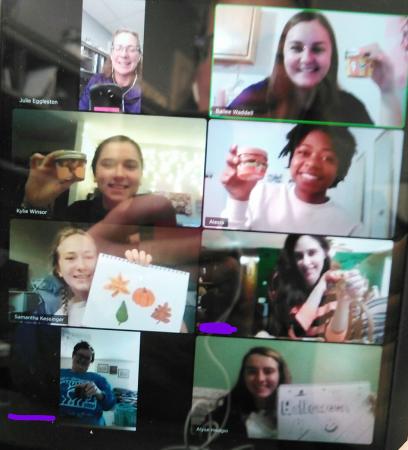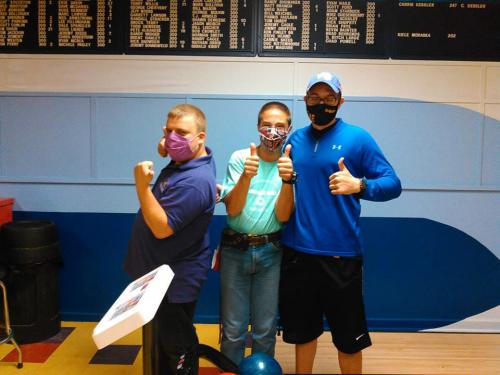University News
Pandemic Provides Unique Programming Opportunities for WIU RPTA Students and MCSRA
November 13, 2020
MACOMB, IL – During a period of time when the COVID-19 pandemic is impacting virtually every activity nationwide, faculty and students in Western Illinois University's Department of Recreation, Park and Tourism Administration (RPTA) are finding a variety of ways to reach the populations they are learning to serve.
RPTA Instructor Julie Eggleston is working with students in her classes to create programming for the McDonough County Special Recreation Association (MCSRA) and residents at Macomb's Bickford Cottage. The MCSRA, housed in the Macomb Park District, provides recreational experiences, including participation in the Special Olympics, for those with disabilities. Bickford Cottage is a local senior living facility.
In her dual role as an RPTA instructor at WIU, and the program director for the MCSRA, Eggleston is reinforcing a strong collaboration between the University and the organization. As a WIU graduate, with both bachelor's and master's degrees in RPTA, Eggleston has a history of working with the MCSRA, performing a graduate assistantship with the organization previously. Macomb Park District Executive Director Rachel Lenz, also a double WIU RPTA graduate, has also previously served as MCSRA director from 2012-14.
Through her therapeutic recreation classes at Western, and utilizing her national certification as a Certified Therapeutic Recreation Specialist, Eggleston is offering her students, and those in other fields such as special education, psychology, social work, sociology and law enforcement and justice administration (LEJA), an opportunity to work in the field, even through the restrictions implemented because of the pandemic.
"Part of the students' assignments is field work, but they can't go into many organizations because of COVID," said Eggleston. "This is a unique opportunity for students to still complete their requirements, and I am thankful to all of the local organizations for this opportunity for them."
At Bickford Cottage, Eggleston's students developed programming that could be done from the parking lot with a speaker system and walkie-talkies, including chair yoga classes, a fall painting class, a pumpkin craft and fondue.
"This is teaching the students methods, but it is also teaching them flexibility because they are planning and executing the programs," she said. "They submit a program plan and a supply list to me and I tweak it and approve it. It's a very nice flow of collaboration."
Within the MCSRA, students are working with participants through virtual activities, such as a partnership with Leatherneck Athletics to match up virtual pen pals with the WIU volleyball team. Eggleston said the team provides video responses from the athletes and question and answer sessions so the MCSRA Special Olympics athletes can stay in touch with their sports.
Lenz said she has been impressed with the forward-thinking programming that has been provided by Eggleston and her students.
"Julie has developed a seamless inclusion program," said Lenz. "It's fantastic to have the MCSRA so closely connected to the University and provide an extra component to the program."
This semester, Eggleston has five WIU students and one Illinois State University student doing field work through the program. She said they are working on future virtual, collaborative classes through WIU, including cooking classes through the nutrition program.
"It is so exciting to be a part of it and have this great opportunity," she said. "The programming makes sense and it is a unique opportunity to give our students to learn and have that realistic life and work experience."
She added that the pandemic is giving students the added component of learning how to provide virtual programming, which those already working in the field are having to learn on the job. The virtual programming has also opened the door for additional participants for the MCSRA programs who couldn't participate before for a variety of reasons, including social anxiety, cost restrictions or transportation issues.
Another component of the student-provided programming, Eggleston said, is the emotional connection students form with those they work with, which is a foundational benefit.
"They are helping to enrich a person's life and those they work with find a place in their heart," she said.
For more information about WIU's RPTA program, visit wiu.edu/rpta. For more information on the MCSRA, visit mcsra.com.
Posted By: Jodi Pospeschil (JK-Pospeschil@wiu.edu)
Office of University Communications & Marketing





Connect with us: